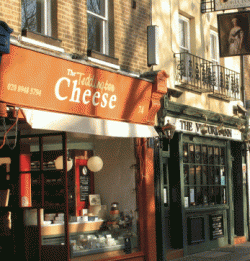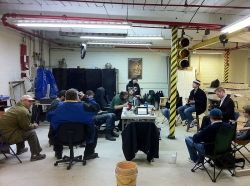Reinventing the High Street
Why The High Street Needs To Change

As of the start of 2013, the tales of economic gloom are everywhere except for one place - the internet businesses. High streets around the world - for me - visibly in the Uk are being decimated. Shops are closing pretty rapidly, being replaced either by pound shops, or food/beverage outlets.
I immediately spotted that this was not a mass closure of all retail. This is not that consumers are no longer spending money, but that they are no longer spending in the high street. The business of buying many items has gone online.
In this lens - I will analyse this trend, and importantly how the High Street may have an opportunity to reinvent itself as a place to be - just not as it was before. Now is not a time for despair, and sitting at home pondering where it will all end. Now is a time to look for new ways to make business - new types of businesses and new ways to use the space in the High Street. I’ll add a few of my ideas, and leave a place for people here to add theirs.
Photo credit: alexliivet / Foter.com / CC BY
Is it Time for the Shopping Precinct to change?
Who knew what the future would look like? Most visions of a science fiction future have included High Street retail and department stores as we know them, just with futuristic products. But it is looking to me like the reality was not at all like we expected. The great interconnected computer web has started rearranging our economy - in a way that makes the retail model look increasingly untenable.
Do you think this is the end of the high street? Do you think it must change? Or do you think it will stay the same?
What happened to Woolworths, HMV and Game

Woolworths is probably one of the most notable High Street brands to disappear at the start of the economic downturn that was known then as the credit crunch. However, from the first day I heard of its impending doom – I do not accept that it was simply down to people having less money to spend.
Woolworths was quite a general store – it sold music, DVD’s, games, housewares, tools, random stuff for the garden, snack foods and quite a lot of nick nacks. However, as Amazon gained ground on music, DVD’s and Games, what chance did they stand? Not only was it very likely that the things you wanted to buy were cheaper on Amazon, but you may take a trip to Woolies only to find they didn’t have it. As Amazon started to sell kettles and similar stuff, Woolies were left competing with either sweetshops, or the cheaper lines or housewares. Between Ikea being very cheap, and Amazon selling all of it – they watched this dry up.
The same fate was there for Virgin Megastores,HMV and Game in the Uk – all selling items that Amazon, and mutliple other online retailers were making a killing in. And then it went even more digital. Music downloads were initially an illegal thing – I remember the original Napster and the controversy it caused. Where are we now? I can buy instantly downloadable music from multiple places online – notably iTunes and Amazon. There are places like Spotify that allow me with a subscription to listen to streams of music I like. I haven’t bought a physical CD in nearly 4 years, and I actually evicted them all via MusicMagpie online the last time I moved. Bricks and mortar retail really cannot offer the convenience of music downloads.
TV has also changed irreversibly. The HD DVD was almost obsolete before it hit the market. Many households now own PVR systems, capable of recording shows, and accessing catch-up and on demand services – so they can watch things they want, rent DVD’s and buy films without leaving the living room. iTunes allows customers to buy films and TV recordings sending them directly to their Apple devices, and netflix, lovefilm and other services also allow this. Again – these are not things that make sense in a bricks and mortar high street store any more. Other than going to the Cinema, all my other recent film rentals or purchases have been online.
Games are now going fully online – with Steam changing the way games were delivered and others following on, the last game I physically purchased was for a PSP about 2 years ago. Everything since then has been delivered via a download.
It is not hard to see now how media like music, films and games no longer require the high street to be traded, and that these High Street retailers were doomed. However – it doesn’t end with media…
How Supermarkets became Online Groceries
And the Reappearance of Food Boutiques

Grocery shopping, apart from the odd top up, or the premium farmers market type goods, has become almost an exclusively online activity for me.
I suspect I am not the only person who hated grocery shopping, and found supermarkets mostly unpleasant, busy, cramped, noisy and smelly places with a feeling of being rushed, stuck in a queue, not quite finding what I wanted. Occasionally I still go – especially for the Christmas groceries, but otherwise I am more than happy to do it all online.
There used to be barriers – fresh vegetables, frozen products and the like – but these have all become solved problems. The additional cost of the driver has become negligible, especially when compared with getting a taxi home if I’ve overdone it. The number of products that can be shown online, that can be stocked in a warehouse far outstrip the number of lines on the shelves. Searching for items is now a matter of typing in a search term, browsing named sections, or even revisiting my favourites and recent purchases. I can even set up shopping templates – where all my regular products are already in a shopping basket so I can top up with anything different/extra and hit go. No queues, no checkout. Sure – I can’t have it today, but with just a little planning – not a problem.
Of course- craft foods, food boutiques and farmers markets are a different story – mostly. A few doors from my house is a Cheese Shop – selling just about every cheese you can think of. But it isn’t a supermarket. Being a boutique – it is staffed by experts – who really know their cheeses, and will take you through tasting a cheese, find out what you like/don’t like. They will remember your previous visits, suggest other things to try, accompaniments that are suitable. Near to me are bakeries, beer shops, and wine shops that are similar. These aren’t mass produced goods with a blank smile holding out the chip and pin – these are places with staff who really take the food experience to the next level. Being a foodie – I enjoy this kind of shopping. I enjoy sampling a pickle, trying out a new chilli sauce at a farmers market and buying a few. And no – a supermarket Deli counter doesn’t even come close to this kind of experience.
This is a place where parts of the high street are being reinvented. Where the supermarket drove food specialists out of existence before, the internet shopping phenomena is reducing the footprint of the supermarkets and allowing the butchers, bakers and candlestick makers back in. Hand crafted, with expertise, and not industrial retail outlets. Visiting the Cheese Shop is like a day out – it is enjoyable – an experience.
The Growth Of The Coffee Shops In The Uk

The British Pub, despite facing setbacks, is a huge part of British culture – a sociable meeting place for drinking, sharing some atmosphere, with the best being places where you become familiar with the staff and the other punters – for some, another living room. It is a culture that has alcohol, and the usage of this is actually in decline – with people wanting a place to go out and be sociable, but not all of them want to drink and because of the migration of populations, not all of them are permitted to. The Pub has reinvented itself somewhat – with the idea of Gastropubs – places to have a beer, be sociable and eat great food. They have lost a little of being the village centre, but those that are good have gained too. However, this decline leaves room for something not altogether new, but definitely on the rise – coffee shops.
Coffee shops are one of the growth areas in the Uk. We’ve always loved cafe’s and eateries, and seeing premium coffee makers spring up in every high street, with streams of customers affirms that they are popular. The British have had tea houses for many years, in the posher areas, but coffee shops are everywhere. While nobody could suggest they are cheap, they offer a comfortable place to sit down, to take a break.
Many of them operate wi-fi networks too, so a customer may roll in to use a laptop and do a little business or pleasure there, or turn up with friends for a sociable occasion. People zip past getting coffee on the way to work, or between meetings, or on the way home. It isn’t difficult to see why this is growing, and why the internet cannot supply a fresh coffee and place to sit down while out and about. The formulae can go wrong – if a places coffee’s don’t taste right, or it is poorly decorated or lacks facilities then it will find this area hard to compete – but there is definitely money to be made in this area. Expect to see more of these on the high streets.
Premium Bookshops are another business that are under attack from the internet – with Amazon outselling them, and being able to offer vastly richer catalogues including printing on demand so stuff doesn’t simply end up being out of print. However, place a coffee shop inside a bookshop – and you have a place which people will rest tired feet, have a coffee, and since they are there, probably buy a book or two as well. This is a reinvention that I love – making bookshops sociable places full of life and removing the stuffiness.
Further Reading on the Changing High Street
I have scratched the surface on this subject. The subject of economics, how we shop and why we shop generated a lot of material to read, but with the way the world is changing, there are authors exploring this change far deeper than I am with insights on how they think the future will play out. I am not an economist - I am a technologist and so I tend to see the future through a shiny-blue LED encrusted lens. Some of these writers are.
Is it game over for UK retail? | Larry Elliott | Business | guardian.co.uk - Talks about the decline of the Bricks and mortar stores, but missed the point about internet sales growth.
The Rise of Crafting Hobbies

The Internet has changed many other things. People are beginning to rediscover old hobbies, and reinvent them. They are sharing their geekery with each other – with all kinds of technical and home crafts gaining footing with huge communities. Publications and blogs on them, along with groups on Facebook, Twitter and just plain chat boards have brought communities together, and then they started to make it physical.
First – it was the odd meet in a pub, or town hall rooms, but then people got together and established places to start doing things together – charitable foundations or shared interest clubs. These are the makerspaces, craftspaces, tools collectives and hackerspaces. Currently they are still a fringe activity – in cheaper corners of the big cities, but a change in the high street could bring them to the fore.
I’d like to imagine a new world – where the fall of high street retail drives retail unit prices down, allowing more experimental business to try new ideas. Certainly these ideas could put crafting or socially engaging with hobbies at the centre of their model.
One High Street retailer that comes close to this is Games Workshop – with their premium Miniatures and stores that encourage painting and wargaming in them, along with painting workshop sessions and seminars or arranged battle events. This is a niche market, but there are many niches.
I’ve seen Pottery cafe’s, and could easily imaging places on the high street for sewing – not stuffy old cloth shops, but a place which has a supply of that premium coffee from above, and then space to work on a project – a bunch of sewing machines to use, perhaps with a fee to gain access to it. The ideas translates to any craft – where the shop would have a library of the tools – both small, and large for customers to use, workspaces for it, storage for projects, materials and more specialist material ordering services on hand. The staff would be experts – these would be boutiques – not mere retail. There would be seminars and workshops for imparting techniques, or show and tells for projects – with some of these being premium. Imagine a high street full of places for people to sociably enjoy fixing broken gadgets and building new ones. People need and want places to develop skills, enjoy their free time, there is a huge market to be exploited.
None of this is new, but it has changed. The British used to “potter” around Sheds and Garages, building or repairing stuff – a solitary activity for an older generation, and this has died as stuff got cheap and disposable, but also as people are living in smaller spaces without the room for a shed or garage. It has become hard for an individual to own some of the tools – some of them are so pricy and yet so rarely used it makes little sense. So making these a sociable, group activity, with specialist businesses exploiting the growth of these and rediscovery of such hobbies sounds like a success story waiting to happen.
Which Retailers Could Change and Remain
I’ve already mentioned the bookshops with a cafe embedded in them. The Lego stores are a bit different – they have their pick-a-brick system, allowing customers to choose bricks, and they have play areas for children. However, Lego is beginning to recognise the AFOLs – Adult Fans Of Lego – who have disposable income, love the toy and brand, and build there own.
So how about bringing those fans into the stores – again – apply the formulae, offer a place to sit and relax, bring your Lego, or buy some, and build, perhaps with a cup of tea. There are considerations here on avoiding theft or getting Lego that is personally own mixed up with the shop ones. There is probably going to be a clean up of smaller bits of Lego spilled on the floor (there already is), but with premium beverages, and spaces to build, and ready access to a nearby Pick-a-brick or stock of models to complete there project, this could see sales and importantly profit from the high street stores rise. Store staff would then need to be experts – able to give customers ideas. They’d help customers turn Lego ideas into working models, hold workshops on advanced building techniques, show off Lego CAD systems, run competitions and challenges in the stores.
What about the internet cafe – a long dead relic of pre-3g, wifi and home broadband days? These could also become specialists. I’ve seen “Gamer” Cafe’s, what about Coder cafe’s though? Bring your own laptop, and they provide a few handy things – again – premium beverages and a nice place to sit down, fast-reliable internet access, a bit of expertise and even some specialist tools – like sample Android and iOS devices or game consoles to test code on.
Reinventing The High Street Conclusion
The High Street is not dead. There is a lot of unemployment – the disruption of the internet is only just beginning to be understood now with whole industry chains being affected by it. But this is not a bad thing – the change is only just starting, and with some innovation it will generate whole new industries.
The high street is not dead- it just needs to change! Long live the high street – I look forward to many more sociable places where people can let out their inner geek in groups.
The innovations here are just my ideas – one guy with a slight bias towards making and crafting – I am sure the readers can come up with so many, many more. And now to you.
I’d love to hear your ideas for high street businesses that are different – especially if you are getting out there and trying to build it. I’d love to hear some of the success and sob stories about it, and what you think the future of public space businesses will look like.